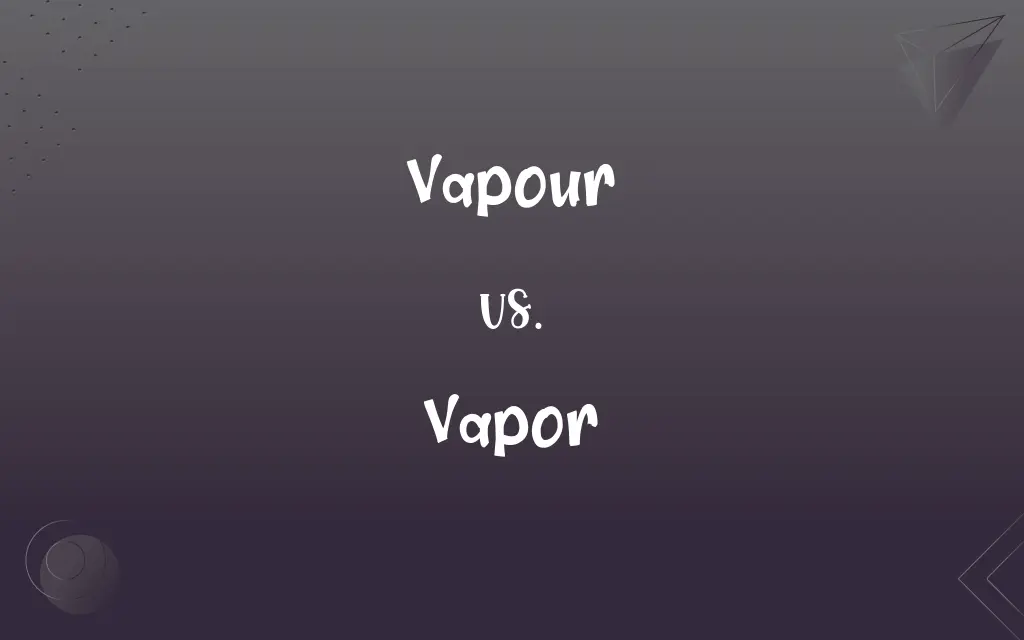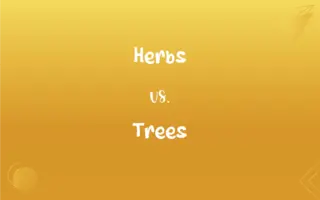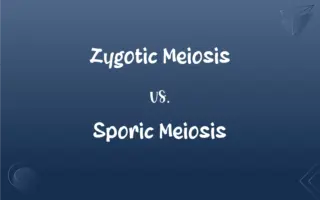Vapour vs. Vapor: What's the Difference?
By Aimie Carlson & Harlon Moss || Updated on March 3, 2024
"Vapour" and "vapor" refer to the same physical state of matter, with the main difference being the spelling preference: "vapour" is used in British English, while "vapor" is favored in American English.

Key Differences
The terms "vapour" and "vapor" both describe the gaseous phase of a substance that is liquid or solid at room temperature. The choice between "vapour" and "vapor" primarily depends on the variant of English being used. In British English, "vapour" is the standard spelling, aligning with other "-our" spellings like "colour" and "honour." On the other hand, American English adopts "vapor," consistent with its preference for "-or" endings, as seen in "color" and "honor."
The usage of "vapour/vapor" extends across various scientific and everyday contexts, from discussions about water vapour in meteorology to the vapor produced by electronic cigarettes. Despite the spelling differences, there is no distinction in meaning or usage based on the context; the choice of spelling simply reflects the regional linguistic preference.
In scientific literature, the spelling may vary depending on the publication's origin or its style guide, but this does not affect the understanding or interpretation of the term. For instance, a British scientific journal may use "water vapour" while an American journal would use "water vapor."
The spelling differences also extend to derivatives of the word, such as "vapourize" (British English) and "vaporize" (American English), which refer to the process of turning into vapour or vapor. This consistency in spelling preference maintains clarity across different forms of the word in both language variants.
Regardless of the spelling, the concept of vapour or vapor is fundamental in various scientific disciplines, including physics, chemistry, and environmental science. It plays a key role in understanding phenomena like evaporation, condensation, and the behavior of substances at different temperatures and pressures.
ADVERTISEMENT
Comparison Chart
Spelling
British English
American English
Usage
Used in contexts where British English is followed
Used in contexts where American English is followed
Examples
"Water vapour is invisible."
"Water vapor is invisible."
Derivatives
Vapourize, vapourous
Vaporize, vaporous
Context
Meteorology, environmental science, everyday language
Meteorology, environmental science, everyday language
ADVERTISEMENT
Vapour and Vapor Definitions
Vapour
Vapour refers to the gaseous phase of a substance normally in a liquid or solid state at room temperature.
The kettle emitted a steady stream of water vapour.
Vapor
Vaporization occurs when a liquid is heated to its boiling point.
The vaporization of alcohol in the solution happens quickly.
Vapour
Vapour plays a crucial role in the Earth's water cycle.
Water vapour from the oceans contributes to cloud formation.
Vapor
E-cigarettes produce a nicotine-infused aerosol, often called vapor.
The room was filled with the sweet scent of flavored vapor from e-cigarettes.
Vapour
Vapour baths have therapeutic uses in various cultures.
The ancient Romans valued the health benefits of vapour baths.
Vapor
The concept of vapor pressure is fundamental in evaporation studies.
Vapor pressure is crucial in understanding how liquids evaporate.
Vapour
Vapour trails are visible paths left by aircraft in the sky.
The clear blue sky was marked by the vapour trails of passing jets.
Vapor
Vapor is the American English spelling for the gas phase of substances not typically gaseous.
Boiling water turns into steam, which is water vapor.
Vapour
Vapour pressure is a key concept in physical chemistry.
The vapour pressure of a liquid decreases as the temperature drops.
Vapor
Vapor barriers are materials used to prevent moisture from passing through walls.
Installing a vapor barrier can help prevent mold growth in homes.
Vapour
Variant of vapor.
Vapor
The gaseous state of a substance that is liquid or solid at room temperature.
Vapour
A visible suspension in the air of particles of some substance
Vapor
A faintly visible suspension of fine particles of matter in the air, as mist, fumes, or smoke.
Vapour
The process of becoming a vapor
Vapor
A mixture of fine droplets of a substance and air, as the fuel mixture of an internal-combustion engine.
Vapor
Something insubstantial, worthless, or fleeting.
Vapor
A fantastic or foolish idea.
Vapor
Exhalations within a bodily organ, especially the stomach, supposed to affect the mental or physical condition. Used with the.
Vapor
A nervous disorder such as depression or hysteria. Used with the.
Vapor
To fill or cover with vapor
Perfume vapored the room.
Vapor
To vaporize
“You wished you'd seen one of the monster shots that vapored an atoll way back when” (Don DeLillo).
Vapor
To give off vapor.
Vapor
To evaporate
The fog vapored away.
Vapor
To engage in idle, boastful talk
Vapored on about his accomplishments.
Vapor
Cloudy diffused matter such as mist, steam or fumes suspended in the air.
Vapor
The gaseous state of a substance that is normally a solid or liquid.
Vapor
Something insubstantial, fleeting, or transitory; unreal fancy; vain imagination; idle talk; boasting.
Vapor
(dated) Any medicinal agent designed for administration in the form of inhaled vapour.
Vapor
Hypochondria; melancholy; the blues; hysteria, or other nervous disorder.
Vapor
(obsolete) Wind; flatulence.
Vapor
(intransitive) To become vapor; to be emitted or circulated as vapor.
Vapor
(transitive) To turn into vapor.
To vapor away a heated fluid
Vapor
To emit vapor or fumes.
Vapor
(intransitive) To use insubstantial language; to boast or bluster.
Vapor
(transitive) To give (someone) the vapors; to depress, to bore.
Vapor
Any substance in the gaseous, or aëriform, state, the condition of which is ordinarily that of a liquid or solid.
Vapor is any substance in the gaseous condition at the maximum of density consistent with that condition. This is the strict and proper meaning of the word vapor.
Vapor
In a loose and popular sense, any visible diffused substance floating in the atmosphere and impairing its transparency, as smoke, fog, etc.
The vapour which that fro the earth glood [glided].
Fire and hail; snow and vapors; stormy wind fulfilling his word.
Vapor
Wind; flatulence.
Vapor
Something unsubstantial, fleeting, or transitory; unreal fancy; vain imagination; idle talk; boasting.
For what is your life? It is even a vapor, that appeareth for a little time, and then vanisheth away.
Vapor
An old name for hypochondria, or melancholy; the blues.
Vapor
A medicinal agent designed for administration in the form of inhaled vapor.
Vapor
To pass off in fumes, or as a moist, floating substance, whether visible or invisible, to steam; to be exhaled; to evaporate.
Vapor
To emit vapor or fumes.
Running waters vapor not so much as standing waters.
Vapor
To talk idly; to boast or vaunt; to brag.
Poets used to vapor much after this manner.
We vapor and say, By this time Matthews has beaten them.
Vapor
To send off in vapor, or as if in vapor; as, to vapor away a heated fluid.
He'd laugh to see one throw his heart away,Another, sighing, vapor forth his soul.
Vapor
A visible suspension in the air of particles of some substance
Vapor
The process of becoming a vapor
FAQs
Can both "vapour" and "vapor" be used in scientific contexts?
Yes, both terms are used in scientific contexts, with the choice of spelling depending on the linguistic preference of the publication or region.
Is there a difference in the physical properties of vapour and vapor?
No, "vapour" and "vapor" describe the same physical state; the difference is purely in spelling.
How does vapour/vapor form from a liquid?
Vapour or vapor forms when a liquid is heated to its boiling point or when it evaporates at lower temperatures, turning into a gas.
Are vapour and vapor considered the same in environmental studies?
Yes, in environmental studies, "vapour" and "vapor" are considered the same and refer to gases formed under natural or artificial conditions.
What is the role of vapour/vapor in the water cycle?
Water vapour/vapor plays a crucial role in the water cycle, involving processes like evaporation, condensation, and precipitation.
How does temperature affect the formation of vapour/vapor?
The formation of vapour/vapor is directly related to temperature; as temperature increases, the rate of evaporation and the amount of vapour/vapor also increase.
Is the term "vapour/vapor" used in both meteorology and climatology?
Yes, the term is used in both fields to discuss humidity, cloud formation, and the impact of water vapour/vapor on climate and weather patterns.
What are some common devices that produce vapor?
Devices like humidifiers, e-cigarettes, and steam engines produce vapor as part of their operation.
Are there health concerns associated with inhaling certain vapours/vapors?
Yes, inhaling vapours/vapors from chemicals, pollutants, or certain organic compounds can pose health risks, including respiratory issues and toxic exposure.
What is vapour/vapor pressure?
Vapour/vapor pressure is the pressure exerted by a vapour/vapor in equilibrium with its liquid or solid phase at a given temperature.
Can vapour/vapor be visible?
While pure vapour/vapor is usually invisible, it can become visible when it condenses into tiny droplets, as seen in clouds or steam.
Does the spelling preference for vapour/vapor extend to other words?
Yes, the spelling preference extends to related words, such as "vapourize/vaporize" and "vapourous/vaporous."
How is vapour/vapor managed in industrial settings?
In industrial settings, vapour/vapor is managed through ventilation, condensation, and recovery systems to ensure safety and efficiency.
How do vapour/vapor barriers work in construction?
Vapour/vapor barriers in construction work by preventing the passage of moisture through walls and ceilings, reducing the risk of mold growth and structural damage.
How do human activities influence water vapour/vapor levels in the atmosphere?
Human activities, such as burning fossil fuels and deforestation, can affect water vapour/vapor levels indirectly by influencing global temperatures and the hydrological cycle.
Can vapour/vapor trails from aircraft affect the environment?
Yes, vapour/vapor trails, or contrails, from aircraft can impact the environment by contributing to cloud formation and, potentially, to climate change.
What is sublimation in the context of vapour/vapor?
Sublimation is the process by which a solid turns directly into vapour/vapor without first becoming a liquid, such as dry ice (solid CO2) turning into carbon dioxide vapor.
What role does vapour/vapor play in the greenhouse effect?
Water vapour/vapor is a significant greenhouse gas, trapping heat in the atmosphere and contributing to the greenhouse effect and global warming.
What innovations exist in vapour/vapor recovery technology?
Innovations in vapour/vapor recovery technology include improved efficiency in capturing and reusing vapours/vapors from industrial processes, reducing environmental impact.
What is the significance of vapour/vapor pressure in everyday products like perfumes and deodorants?
Vapour/vapor pressure is significant in products like perfumes and deodorants as it affects how quickly the product evaporates after application, influencing its intensity and duration.
About Author
Written by
Aimie CarlsonAimie Carlson, holding a master's degree in English literature, is a fervent English language enthusiast. She lends her writing talents to Difference Wiki, a prominent website that specializes in comparisons, offering readers insightful analyses that both captivate and inform.
Co-written by
Harlon MossHarlon is a seasoned quality moderator and accomplished content writer for Difference Wiki. An alumnus of the prestigious University of California, he earned his degree in Computer Science. Leveraging his academic background, Harlon brings a meticulous and informed perspective to his work, ensuring content accuracy and excellence.































































